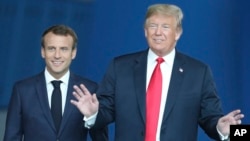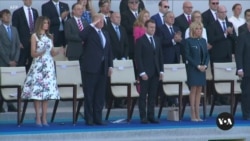America's allies in Europe are debating how to prepare for a possible second term for Donald Trump in the White House after he secured a record win at Monday's Iowa Republican caucuses, cementing his place as front-runner to take on Joe Biden in November's election.
Questioned at a televised news conference Wednesday about the possibility of a Trump comeback, French President Emmanuel Macron said Europe must be prepared.
"I've always had the same philosophy: I take the leaders that people give me. And I commit to serve France and its interests and to dialogue with whomever. I did it with President Trump during his whole term, his first term, and we achieved results. We could still do important things together," Macron said.
"[America] shares our values. But it's a democracy that is also going through a crisis, whose top priority is its own interest, and its second priority the issue of China. As Europeans, we must be lucid about this. That's also why I want a stronger Europe that can defend itself and not depend on others," the French president told reporters in Paris.
Macron and Trump had a fractious relationship during the latter's first term in office. On the Iowa campaign trail this month, the former U.S. president appeared to mock the French leader's accent, to the delight of his supporters — a reminder of Trump's unconventional diplomatic style.
But Europe has bigger concerns than personality politics. With Russia's invasion of Ukraine descending into a bitter war of attrition, Kyiv urgently needs Western military aid.
Trump has said he would seek an immediate peace deal between Ukraine and Russia. His Republican supporters in Congress are blocking about $50 billion in military assistance for Kyiv. NATO allies are worried that aid could dry up entirely.
"The U.S. is paying a bit less than half of that share" of Western aid, said Fabrice Pothier, a former head of policy planning at NATO and now CEO of the political consultancy Rasmussen Global.
"But the U.S. has a very predominant, if not the lead role when it comes to the strategic political questions on Ukraine. So losing the U.S., in the sense of having a U.S. president who might be actually counter to Ukraine's interests and to Europe's interests, would be a major blow," he said.
In a town hall meeting last week, Trump refused to commit to U.S. membership of NATO in a second term in office when he was asked by the Fox News host.
"Depends on if they treat us properly," Trump said. "NATO has taken advantage of our country. The European countries took advantage … they took advantage of us on trade. And then they took advantage of us on our military protection."
EU Commissioner Thierry Breton claimed this month that Trump said in 2020 that the U.S. would "never help Europe if it came under attack" and that it would leave NATO. Trump officials did not comment on Breton's claim.
The former U.S. president frequently demanded that America's NATO allies spend more on their own defense. Alexander Stubb, the front-runner for the upcoming presidential election in Finland — NATO's newest member — said Trump was right.
"We need a more European NATO," Stubb told Reuters at the annual World Economic Forum in Davos, Switzerland. "I think the Americans will not leave us alone, but it's always useful to be prepared in the situation whereby we have to take more responsibility of our own defense. And I think the Americans are right on that."
Europe is investing more in defense, including ramping up ammunition and weapons production for Ukraine. But replacing the central role the U.S. has assumed on Ukraine under President Biden would take time — something Kyiv doesn't have.






